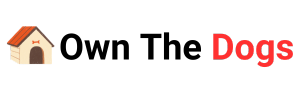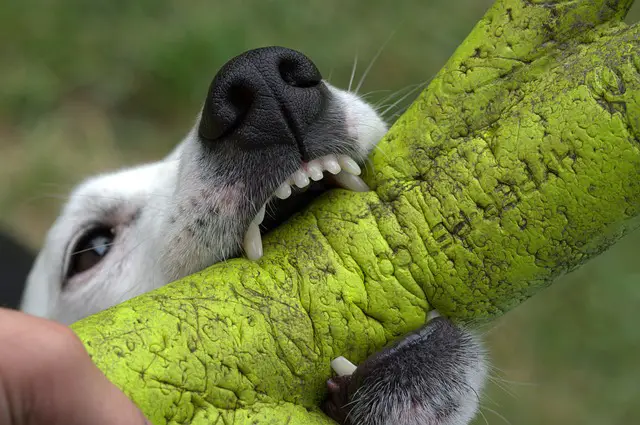Dogs are renowned for their diverse means of communication, and one intriguing behaviour that certain dogs display is nibbling or gentle biting. As a devoted dog owner, it is natural to ponder the reasons behind this behaviour.
This article tell the underlying factors that contribute to dogs nibbling on their owners, exploring both the innate and social aspects. By comprehending the motivations behind this behaviour, you can deepen your bond and strengthen your relationship with your furry companion. So, lets know Why Does My Dog Nibble on Me?
Understanding Canines’ Innate Instincts
To truly grasp why dogs nibble on their owners, it is crucial to consider their innate instincts. Being descendants of wolves, dogs have inherited certain behaviours deeply ingrained in their DNA throughout generations.
One such behaviour is mouthing or nibbling, which is commonly observed during their puppyhood. Puppies explore their surroundings by using their mouths, and this behaviour can persist into adulthood for some dogs.
Exploring Social Interaction and Strengthening Bonds
Nibbling can also serve as a means of social interaction and strengthening bonds. Dogs pack animals and possess a natural inclination to form strong bonds with their human family members.
Nibbling can be their way of expressing affection and fortifying their connection with you. It signifies trust and serves as a means of seeking your attention.
Expressing Affection and Playfulness
Similar to how humans express affection through gentle touch, dogs may resort to nibbling on their owners to convey their love and playfulness. Nibbling becomes a part of their natural repertoire for expressing affection, particularly during moments of excitement and joy.
It is important to note that nibbling in such instances is typically gentle and non-aggressive.
Nibbling as a Mode of Communication
Dogs communicate through a combination of body language, vocalizations, and behaviours. Nibbling can function as a form of communication, conveying various messages depending on the context. For instance, if your dog lightly nibbles on your arm or leg, it could be interpreted as a request for attention or a desire to engage in play.
Understanding the specific circumstances surrounding the nibbling behaviour can aid in deciphering the intended message.
Addressing Teething and Oral Sensations
In the case of puppies and young dogs, nibbling may be linked to teething and the associated discomfort. Similar to human infants, puppies experience teething as their adult teeth emerge. Nibbling provides relief for sore gums, acting as a natural way to alleviate discomfort.
Offering appropriate chew toys can redirect their nibbling behaviour toward more suitable objects.
Identifying Anxiety and Nervousness
In certain instances, dogs may nibble on their owners due to anxiety or nervousness. When dogs feel stressed or overwhelmed, they may turn to nibbling as a coping mechanism. It is crucial to identify the underlying cause of their anxiety and address it accordingly.
Consulting with a professional dog trainer or animal behaviourist can provide valuable insights and guidance in such situations.
Recognizing Health Issues
Excessive or unusual nibbling can be an indication of underlying health issues in dogs. Skin irritation, allergies, or even pain can trigger increased nibbling behaviour. If you observe persistent nibbling in specific areas of your dog’s body or notice signs of discomfort, it is advisable to consult a veterinarian to rule out any potential medical conditions.
The Importance of Training and Establishing Boundaries
Establishing clear boundaries and training your dog is crucial in addressing and redirecting nibbling behaviour. Consistency is key when teaching your dog what is deemed acceptable and what is not.
Reward-based training methods can be highly effective in shaping their behaviour and discouraging undesirable nibbling. With proper training, you can guide your dog to engage in appropriate forms of interaction.
Redirect to Nibbling Behavior
If your dog’s nibbling behaviour becomes bothersome or uncomfortable, redirecting their attention towards more appropriate activities is essential. Introducing interactive toys, puzzle games, and engaging exercises that stimulate their minds provides an outlet for their energy. By redirecting their focus, you can help alleviate the urge to nibble on you.
Providing Suitable Chew Toys and Alternatives
To satisfy your dog’s natural inclination to chew, it is crucial to offer suitable chew toys and alternatives. Ensure that the toys are safe, durable, and specifically designed for dogs.
By providing enticing chew options, you can redirect their nibbling behaviour towards appropriate objects, safeguarding your skin and household items from unintentional nibbles.
Seeking Professional Assistance
If you find it challenging to address your dog’s nibbling behaviour on your own, seeking professional help can be beneficial. Professional dog trainers and animal behaviourists possess the expertise and experience to comprehensively evaluate your dog’s behaviour. They can provide customized strategies and guidance to effectively manage and modify your dog’s nibbling tendencies.
Frequently Asked Questions (FAQs)
How can I differentiate between playful nibbling and aggressive biting?
Distinguishing between playful nibbling and aggressive biting can be determined by factors such as intensity, body language, and overall context. Playful nibbling is typically gentle, accompanied by relaxed body language, a wagging tail, and a playful demeanour.
Aggressive biting, in contrast, is forceful and may be accompanied by growling, snarling, and a stiff body posture. If you are uncertain, it is advisable to consult a professional to assess your dog’s behaviour.
Should I discourage my dog from nibbling altogether?
Discouraging nibbling behaviour altogether may not be necessary, especially if it is gentle and non-aggressive. However, it is essential to establish boundaries and redirect their attention to appropriate objects. Consistency in training and reinforcing positive behaviour will help strike a balance between allowing nibbling as a form of affection and maintaining respectful interaction.
Can dogs outgrow nibbling behaviour?
Most dogs outgrow nibbling behaviour as they mature and develop better impulse control. However, some dogs may retain certain forms of nibbling as part of their natural communication or affectionate behaviour. Proper training and redirection can help manage and regulate their nibbling tendencies.
Are there any health risks associated with nibbling?
In general, gentle nibbling poses minimal health risks. However, excessive nibbling or chewing can lead to skin irritation or injury. It is crucial to monitor your dog’s nibbling behaviour and ensure they have appropriate chew toys to prevent any potential harm.
Is nibbling more common in certain dog breeds?
Nibbling tendencies can vary among different dog breeds, but they are not exclusive to any specific breed. The behaviour may be influenced by a combination of genetic predispositions, individual personality traits, and environmental factors.
Conclusion
Understanding the reasons behind Why Does My Dog Nibble on Me is vital for fostering a harmonious relationship. Whether rooted in innate instincts, social bonding, or communication, nibbling can hold various meanings.
By recognizing the underlying motivations and addressing any underlying issues, you can ensure a healthier and more enjoyable interaction with your furry friend.


